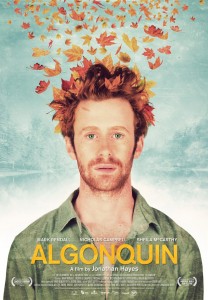For better or for worse, Algonquin is unpredictable. What starts as Canada’s independent answer to last year’s Academy Award nominee Nebraska finds unique footing after a detour in its narrative.
I suppose any film related site listing the synopsis for Jonathan Hayes’ feature film debut would give away this major turn. Because I certainly didn’t see it coming, I’ll back away from that specific spoiler. It’s an example of how Hayes isn’t afraid of making a big move to progress his script in a direction that challenges his characters. Especially when the pivotal crisis involves an absentee father and his bitter son.
Nicholas Campbell plays the distracted father Leif with a kind of charm that’s charismatic, funny, and understandably discouraging to anyone who’s been stiffed by him. Jake (played by Mark Rendall) feels like one of these suckers after being abandoned by Leif at a young age and invited back into his life years later to help co-write a new book his Dad is cooking up. Leif proposes that the book is written in Algonquin Park- where the Roulette family had a cabin.
What I appreciate about Algonquin is that Hayes has his characters being very upfront with each other. Jake has the personality of someone who could be dismissed easily, but his frustration won’t be smothered out. It gives that backbone to our relatable lead.
Rendall shows that he’s much more comfortable in the dramedy realm than he is providing strained comic relief (see: The Birder). He’s quite capable of carrying a lot of the film’s weight. The rest of the cast show similar comprehension to the material which includes a star-making performance by Michael Levinson and a subdued but affectionate role from Sheila McCarthy.
Hayes does provide comic relief to break up any sort of tension. It comes in the form of Canadian character actor Boyd Banks. His role as a stern park ranger steps away from any obvious jokes, and Banks gives his performance the proper amount of quirk it needs to steady the humour. It’s a great support for Algonquin and the film would be much different without him.
The indie is very simple. And even though Hayes’ screenplay deals with family matters and re-connectivity after many years, it doesn’t cut too much past its surface. At least, for the first third or so.
I understand that Hayes is taking his time to develop Jake, Leif, and the rest of his eclectic cast, but it’s development that displays itself as sweet and goodnatured and doesn’t provide the necessary requirements to flesh anyone out.
It appears that Algonquin has to hit rock bottom in order to figure out how to rightfully find itself. There’s an exchange between Jake and another woman that the filmmaker hopes to come off as a moment of shared vulnerability and grief. Instead, it gets a variety of mixed reactions and cringes. It’s a giant misstep that could’ve been addressed and dealt with similarly if one of the characters slapped the other and told them to “snap out of it”.
Hayes miraculously bounces back from this scene and smartly never brushes on it again. Algonquin starts building momentum once again with poignant, honest talks between leads that make them more believable and sympathetic. Before we know it, the film is hitting home runs and delighting us.
Hayes’ film is sublimely shot around and in Algonquin Park and gives the audience plenty of beauty shots. The fall air gives a special type of warmth to the film. You could literally extract any scenes out of the film and edit them together to showcase how gorgeous Canada’s forests are.
Like Jake’s trip he embarks on, Algonquin retraces its steps to tie everything up nicely. Apart from the authentic voices behind these people, this ability to wrap everything up perfectly is another aspect of Algonquin I find absolutely admirable.
Overall, I thought Algonquin was a really good film with a heaping amount of heart. It has very few flaws, but this is the kind of Canadian indie that represents the country and the independent scene very well. That misstep may briefly dirty the purity Algonquin wades in, but it at least shows that even the smallest of Canadian films are fearless underneath the quaintness.




Be the first to comment